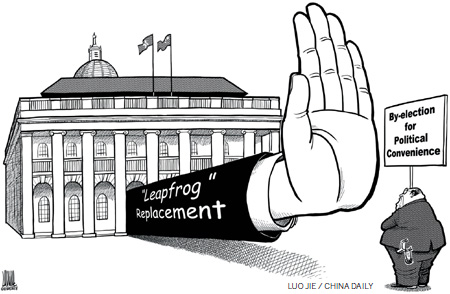Abandoning by-elections a violation of the law?
Updated: 2011-06-23 06:43
By Song Sio-Chong(HK Edition)
|
|||||||


On June 17, the Hong Kong Bar Association (HKBA) wrote a press release accusing the government's proposal to do away with by-elections as a violation of the law.
It said that the replacement arrangement for filling a casual vacancy arising from the resignation of members of the Legislative Council (LegCo) and other proposals in the Legislative Council (Amendment) Bill 2011 was not compatible with Article 26 and 68 of the Basic Law and several articles of the International Convention on Civil and Political Rights as well as the Hong Kong Bill of Rights Ordinance.
It was also reported that 63 educators, including 12 political science professors in Hong Kong tertiary institutions and universities, had expressed the same view.
But these criticisms appear to make a mockery of common sense. From among approximately 200 nations in the world, there are more than 80 nations which have adopted a proportional representation voting system like Hong Kong to elect their legislative members. In the event of vacancies in their legislatures, those vacancies are usually filled by various replacement or substitution methods without by-elections.
If those practices are in contravention of the International Convention as the HKBA and some scholars have indicated, then more than 40 percent of the world's nations have also committed the same offense.
It is true that a little knowledge is a dangerous thing. What they are attacking is not only the Hong Kong administration which has proposed the bill, but also at least 80 national or regional governments distributed over five continents, including Australia, Belgium, Brazil, Finland, Germany, India, Ireland, Italy, Japan, New Zealand, Norway, Portugal, Russia, Scotland, South Korea, Spain, Sweden, Switzerland and many others, to name but a few.
They are making serious but groundless accusations that those governments, who have the same practice, do not observe and respect the international law they have signed and/or ratified.
Their blames appears to be a mockery of general elections. In fact there are both small and large geographical constituencies in different nations. In small constituencies where the "one seat one vote" rule applies, by-elections are necessary in case of vacancy, or otherwise the loser in the original election will take the place via the replacement method.
So it sounds reasonable that the same "one seat one vote" rule be applied in both general elections and by-elections. But for larger or very large constituencies with several seats, the replacement or substitution method may be more reasonable. It would be illogical and inconsistent indeed if the general election is carried out through a voting system of proportional representation and by-elections are conducted under the "one seat one vote" rule.
In Hong Kong's present LegCo's geographical elections, there are five geographical constituencies with four to eight seats each dependent on the number of registered voters. The larger the number of voters, the more seats there will be with a 15 percent deviation. In the light of more than 3 million registered votes and 30 seats, the voters' base was about 100,000 per seat in the general election in 2008.
If the "one seat one vote" rule is however used in the by-election during the term, then the voters' base will range from more than 400,000 to 800,000. It will be against the principle of equal suffrage as stipulated in the International Convention.
The HKBA asserted that if the replacement or substitution method is used without a by-election, it will deprive the voting rights of Hong Kong permanent residents conferred by Article 26 of the Basic Law and violate the mandates that the LegCo "shall be constituted by election" as given in Article 68 of the Basic Law. Legislator Leung Kwok-hung (aka "Long Hair") has threatened to apply for a judicial review of the case. This is misleading.
For example, in the 2008 LegCo election, if Tanya Chan of the Hong Kong Island constituency had resigned under the replacement arrangement, her seat would have been substituted by Lo Wing Lok. Similarly if Wang Yuk Man of Kowloon West constituency had resigned, then his seat would have been taken by Mo Man Ching. Both Lo and Mo had participated in the same general election. How can Articles 26 and 68 of the Basic Law be violated?
One scholar has warned that if the new replacement arrangements take effect, then the HKSAR would have an unexpected terrorist event, because the likely replacing candidate who failed in the general election would have a motive to assassinate any lawmaker in his or her constituency in order to substitute.
If we follow this logic, then it would be absurd and perhaps defaming to say that Lo had the motive to kill Chan, and Mo would intend to make Wang disappear. It is the same as to conclude that the vice-president of the United State is the suspected killer of the president. What a prolixity and nonsense!
Honestly speaking, the by-election held last year for filling vacancies in LegCo is not in conformity with the universal practices of the proportional representation voting system. So the administration is making the right move with its amendments, with or without the so called de facto referendum on May 16, 2010. It is never too late to fix the problem.
The author is a current affairs commentator.
(HK Edition 06/23/2011 page3)